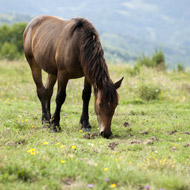Report shows significant fall in fly grazing

The Act gives Local Authorities the power to seize, impound and euthanise horses which are in public places without lawful authority.
There has been a ‘significant reduction’ in the number of horses being fly-grazed in Wales, according to a report published by Equiventus Ltd.
The report, commissioned by the Welsh Government, comes three years after the introduction of the Control of Horses (Wales) Act 2014. It found that the reduction in fly-grazing is, amongst other things, the result of increased education and a rise in public awareness.
‘In the three years since the introduction of the Control of Horses (Wales) Act 2014 there is clear evidence to show a reduction in the number of horses reported and ultimately removed, due to fly grazing straying or abandonment,’ the report notes.
‘The evidence available demonstrates the reduction in this behaviour is attributed to a number of key factors: these include the swift introduction of the Act, an increase in education programmes for horse owners, the rise in public awareness of the potential problem and improved collaborative working across all stakeholders to address concerns’.
The Act was introduced by the Welsh government response to calls for action by Local Authorities, equine charities and the Police to tackle the problem of fly grazing, straying and abandonment of horses across Wales. Under the act, local authorities are given the power to seize, impound and euthanise horses which are in public places without lawful authority.
Speaking to Farmers Weekly, rural affairs secretary Lesley Griffiths said that the Act had been important in reducing fly grazing. But she added: “While the report is very good news, we should not let our guard down.
“I am determined to continue to do what’s needed to combat the blight on communities caused by the fly-grazing, straying and abandonment of horses and ponies.”



 The RCVS has announced a new version of its 1CPD mobile app, with enhanced features for veterinary surgeons and veterinary nurses to record their continuing professional development.
The RCVS has announced a new version of its 1CPD mobile app, with enhanced features for veterinary surgeons and veterinary nurses to record their continuing professional development.